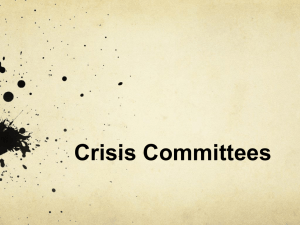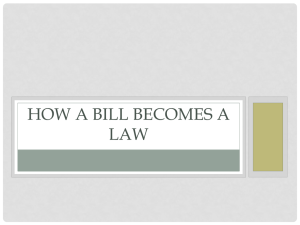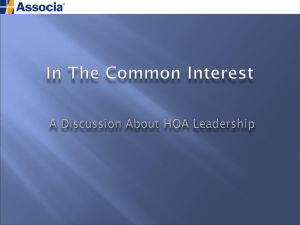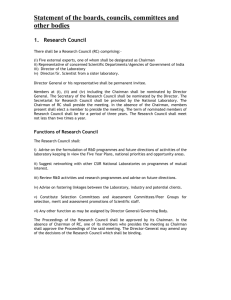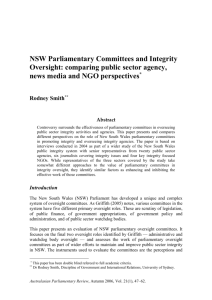BKSCZLIGCPWNSYEQTSESFYAWGJPPRV
advertisement
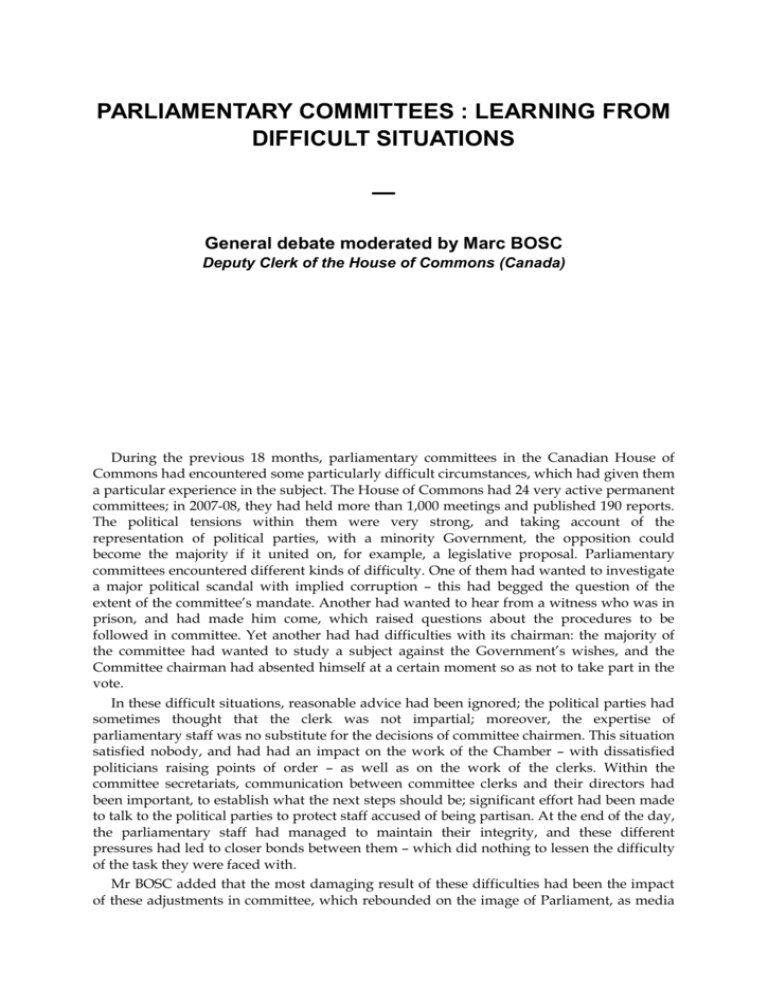
PARLIAMENTARY COMMITTEES : LEARNING FROM DIFFICULT SITUATIONS — General debate moderated by Marc BOSC Deputy Clerk of the House of Commons (Canada) During the previous 18 months, parliamentary committees in the Canadian House of Commons had encountered some particularly difficult circumstances, which had given them a particular experience in the subject. The House of Commons had 24 very active permanent committees; in 2007-08, they had held more than 1,000 meetings and published 190 reports. The political tensions within them were very strong, and taking account of the representation of political parties, with a minority Government, the opposition could become the majority if it united on, for example, a legislative proposal. Parliamentary committees encountered different kinds of difficulty. One of them had wanted to investigate a major political scandal with implied corruption – this had begged the question of the extent of the committee’s mandate. Another had wanted to hear from a witness who was in prison, and had made him come, which raised questions about the procedures to be followed in committee. Yet another had had difficulties with its chairman: the majority of the committee had wanted to study a subject against the Government’s wishes, and the Committee chairman had absented himself at a certain moment so as not to take part in the vote. In these difficult situations, reasonable advice had been ignored; the political parties had sometimes thought that the clerk was not impartial; moreover, the expertise of parliamentary staff was no substitute for the decisions of committee chairmen. This situation satisfied nobody, and had had an impact on the work of the Chamber – with dissatisfied politicians raising points of order – as well as on the work of the clerks. Within the committee secretariats, communication between committee clerks and their directors had been important, to establish what the next steps should be; significant effort had been made to talk to the political parties to protect staff accused of being partisan. At the end of the day, the parliamentary staff had managed to maintain their integrity, and these different pressures had led to closer bonds between them – which did nothing to lessen the difficulty of the task they were faced with. Mr BOSC added that the most damaging result of these difficulties had been the impact of these adjustments in committee, which rebounded on the image of Parliament, as media articles and letters received by the Speaker had shown. If the Canadian political system was subject again to a minority Government, it would probably be necessary to look at revising the Standing Orders of the House of Commons. He concluded by asking what difficulties other parliaments had encountered, what experiences they had had and what solutions they had come up with. Mr Anders FORSBERG, President, stressed the importance of matters of political balance and their effect on the functioning of Parliament. He opened the debate to the floor. Mr Xavier ROQUES (France) said that the French National Assembly had only six committees, which thus made up “mini-parliaments”, given how many members they had (73 or 146). All of the committee chairmen came from the majority, except – for a little time now – the chairman of the Finance Committee. This chairmanship in opposition hands was of media interest; however, although this chairman could summon famous personalities or ministers to address the committee, and could express himself in an official capacity, he remained nonetheless part of the minority on his own committee – especially when it came to a vote. At times, this chairman could also find himself reproached by his political allies, who thought him too moderate. Relations between committee members were good; there was a certain amount of absenteeism, but a gentleman’s agreement was applied when the opposition temporarily found itself in the majority at a meeting, some of the members left during the vote, or the meeting was suspended. The way these committees worked meant that the parliamentary staff working for them could have to write a paper making one case, and another making the contrary case, for two Members of different political persuasions. Thus, the same person who worked on a financial legislative proposal for a rapporteur from the majority, highlighting the qualities of the text, could then put together for opposition parliamentarians a reference to the Constitutional Court aiming to emphasise the faults of the same text. In summary, it was rare for parliamentarians to behave aggressively towards parliamentary staff. Mr Manuel ALBA NAVARRO (Spain) said that as secretary general, he gave advice to the heads of committee secretariats, but that in any case, at the end of the day, it was for parliamentarians, albeit advised by functionaries, to take the decisions. There were sometimes differences between committee chairmen and some of the committee members – all the more so as some committees looked at highly politicised issues. If the committee chairman has certain powers, and can at times consult the Speaker, he cannot act as he wishes; if his decision breaches the relevant rules, his authority will be questioned. Mr Douglas MILLAR (United Kingdom) said that the work of parliamentary staff was more difficult when the parliamentary majority was made up of a coalition. This work assisting parliamentarians was thus particularly complex and difficult in 1974, as a result of the volatility of the political situation. In such situations, officials had to behave as professionally as possible, and make clear to parliamentarians what they could expect from the administration. It could happen that the secretary general could become a sort of scapegoat in complex situations. In any case, even if the Speaker is able to intervene in committee affairs, he does so only rarely, so as to avoid exacerbating the difficulties and so that he is not called on to intervene more frequently. Mrs Doris Katai MWINGA (Zambia) said that in the Zambian parliament, the party in power had the majority, but that this was not the case in committee, as some MPs were ministers. Committee chairs came from the opposition. Two years ago, a committee wanted to attack the Zambian President on health issues, and decided to take evidence from a nongovernmental organisation working in this area, the chair of which was the President’s wife. Mrs Mwinga said that she had taken charge of this business: she had told the committee concerned that it was possible to gather information by hearing from other higher quality witnesses, and in the end the committee had not summoned the “First Lady”. Secretaries General had to try to inspire confidence in their staff, to allow them to face difficult situations and criticism, and to find satisfactory solutions. Ms Claressa SURTEES (Australia) said that the remits of the committees of the Australian House of Representatives matched those of the different ministries, while the composition of the committees reflected that of the Chamber; because of this, the majority in committee was always held by the parliamentary majority. Each committee had its own rules of proceeding, but some conventions applied across the board, for example the fact that the committee chair belonged to the majority – even if there were exceptions. It had happened in the past that a committee chair directed business in a worrying way, organising meetings late at night in unlikely places, in order to prevent members from attending and opposing decisions he wished to take. This situation was difficult for the secretariat of the committee, whose advice had been rejected by the chair. Mr P.D.T. ACHARY (India) said that in the Indian parliament, the problems mentioned earlier did not occur: the parliamentary majority was reflected in the composition of the committees, and India had never known a minority coalition government. In the course of committee work, parliamentarians followed the political line of their party, but generally managed to reach a consensus, except on some very political issues. The Standing Orders set out in great detail the mandate of the committees, and the Speakers of the Chamber had set out practical rules as well. The Speakers exercised disciplinary control over the committees, and their decisions were final and binding. The committee secretariat strove to maintain their integrity, especially following a change to the majority, and this helped them to be respected as much by the majority as by the opposition; there was thus a consensus on the impartiality of the secretary general. Mr Geert Jan A. HAMILTON (Netherlands) said that eleven parties were represented in the Dutch Senate. The chairs of the 16 committees were shared between several parties, and the committees functioned according to rules, both written and unwritten. He explained that after the most recent elections, half of senators were newly elected, and it had been necessary to explain to them the role of the secretariat. This had to be apolitical, independent and available to all; as soon as a controversy arose, staff could be challenged, which meant that they had to be very vigilant. Mr Félix Owansango DAECKEN (Gabon) added that in Gabon, conflicts over remit often arose between the different committees in the context of a particular text, especially where texts had several aspects and could thus interest several of the six permanent committees. Because of this, it was not necessarily the same committee that considered a text in the National Assembly and in the Senate. In such a case, the neutrality of the secretary general could be challenged. These problems over remit could be most often sorted out within the Bureau. Mr Tapan CHATERJEE (India) shared his experience of a controversial bill, which aimed to amend the Constitution by giving a part of the Indian State a specific status of autonomous district. This bill had led to widespread reaction, leading to unrest, even violence. A delegation from the state of West Bengal comprising about thirty representatives of parties had asked to meet the Chairman of the relevant committee; Mr Chaterjee had advised the chairman that the whole committee should receive this delegation, working on the basis of consensus. The committee had then decided to visit the area in question to meet local people. Now the committee had to ask the Speaker for permission to travel as a delegation; the Speaker asked for the opinion of the State Government, which feared violence and unrest if the visit took place. In the end, the Committee decided not to travel, but heard from representatives of the Government. The bill had not yet come to a vote, but a crisis had been avoided. Mr Anders FORSBERG, President, said that politicians knew more and more about the work of committees, and had ever higher hopes for them. Mr Marc BOSC (Canada) thanked participants for sharing their experiences, and said how interesting the different examples raised had been, along with each person’s reaction in a difficult situation. Following a crisis, it seemed important to bring a team together to record the actions taken, even in a spirit of self-criticism, and to think of improvements. The greater a controversy, the more officials had to show themselves to be clear and professional in collating information and giving advice.
